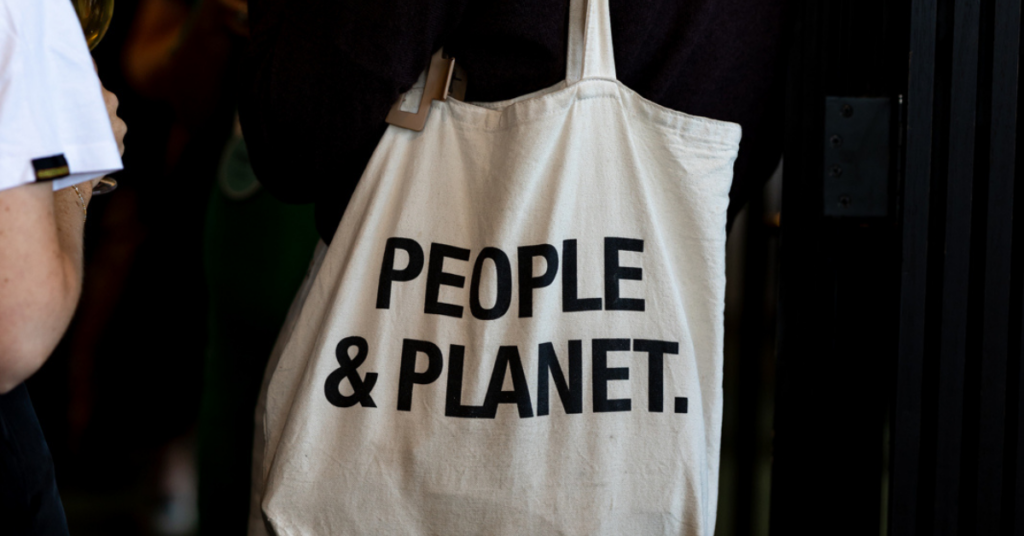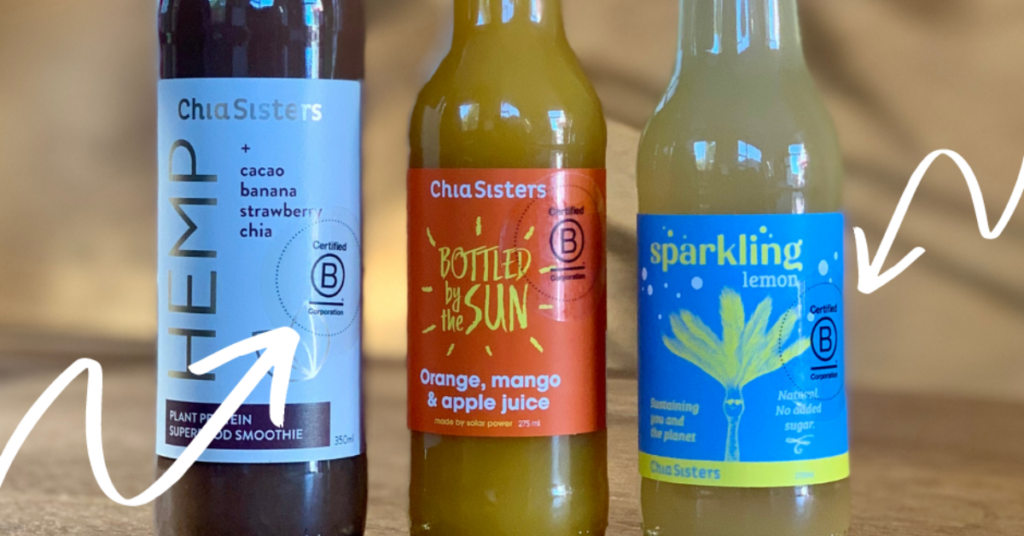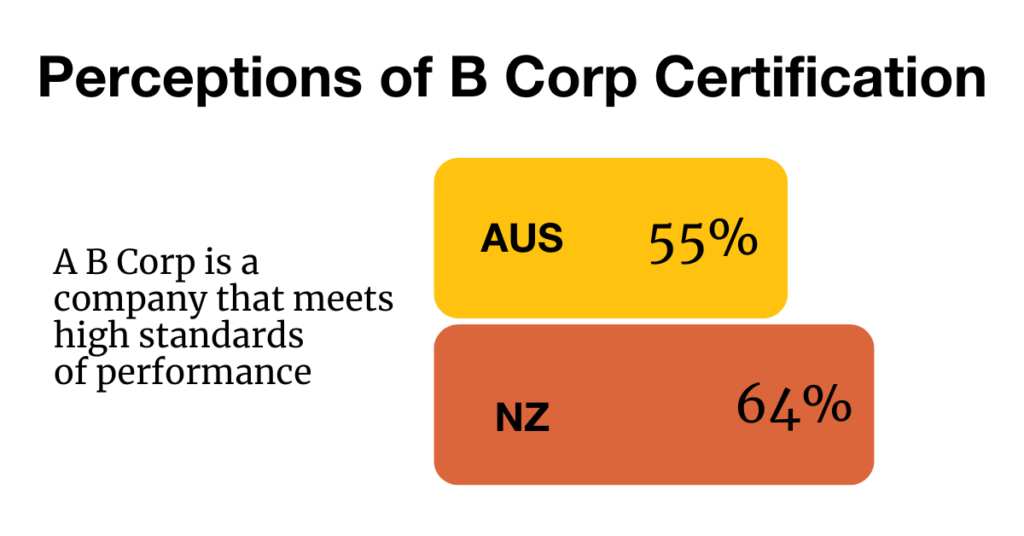Dedicated to steering the global economy towards one that benefits all people, communities, and the planet, B Corps have been independently certified to go beyond business as usual and proactively meet high standards of social and environmental performance, accountability, and transparency.
Since 2006, the number of Certified B Corporations has steadily grown, but that trajectory accelerated exponentially in 2022, doubling from 4,000 to 8,500+ globally. The B Corp movement now spans across 98 countries, 160+ industries, and employs over 780,000 people. And as the number of B Corps continues to grow across all industries worldwide, more and more people are coming to recognise the ‘B’ and what it stands for. So, just how widespread is that awareness?

Methodology and survey design
In December 2023, B Lab Australia and Aotearoa New Zealand (B Lab AANZ) ventured, for the first time, into a comprehensive exploration of brand awareness and perception of the B Corp movement in our region.
Mirroring similar research across our global network, we partnered with digital insights platform Cint and local strategic insights consultancy and B Corp, Nature, to survey and analyse data from general population samples across the region.
Surveying over 2,000 respondents across Australia and New Zealand, the study captured a wide age range (18-65) and included representation from all Australian states and territories, and both islands of Aotearoa. Digging into the global shifts towards more conscious consumption, attitudes towards certifications and understanding of responsible business practices, the survey included a series of 30 questions and was conducted online.
Yielding some pivotal insights, the findings not only benchmark our progress as a movement but also chart a course for growth. Here are five highlights and trends from the research, as well as ways we can all continue to amplify awareness about the B Corp movement and its impact.

1. The ‘B’ logo is becoming increasingly recognisable
It’s taken a lot of hard work from a great many people to get here, but we are excited to see that the B Corp logo is becoming increasingly recognisable not just in Australia and Aotearoa New Zealand, but across the world.
Awareness of the ‘B’ averages 18% in Australia and 15% in Aotearoa New Zealand, over all age groups, which equates to nearly 1 in 5 and just under 1 in 7, respectively.
While these numbers are a little lower than what we see in the US (36%) or the UK (38%) given the relative infancy of the movement in our region, this level of visibility plays a key role in enhancing consumer trust and cementing the reputation of B Corps as leaders in ethical business.

2. Awareness is strongest with young people, but knowledge of certification is stronger in the mid-age range
From the data we can see that awareness of the B Corp logo is highest amongst 25-34 year olds (30%) across the region, which mirrors trends in other parts of the world. For example, in a similar study conducted by B Lab U.S. & Canada, Millennial and Gen Z awareness of B Corp Certification is high compared to other generations (51% in the U.S. and 47% in Canada), as compared to an average of 36% or 35% respectively.
This is a generation more purpose-driven than ever before. But before you start to skew all of your marketing and awareness activities towards Millennials and Gen Z, it’s worth noting that while this age cohort is found to consistently prioritise environmental concerns more than any other generation, they also exhibit the highest level of scepticism towards inconsistent messaging and greenwashing.
So, while Millennials and Gen Z might not trust brands’ claims regarding environmental, social, and governance (ESG) factors, a rigorous independent third party certification like B Corp can play a core role in overcoming that through high levels of accountability and transparency.
Furthermore, while awareness in the youngest cohorts (18-24; 25-34) are more likely to have heard of B Corp or recognise the logo, those in the mid-age range (35-44; 45-54) demonstrate a stronger understanding of what B Corp Certification involves.
What the survey results suggest is a distinction between recognition of the B Corp logo and a deeper understanding of what B Corp Certification actually signifies.
This underscores a key opportunity to enhance the depth of understanding about B Corp Certification across different demographics. It also sets the stage for future growth throughout the B Corp community, especially when it comes to the impact we can have on realising our vision of a more kind, equitable and regenerative global economic system.

3. B Corp Certification is positively impacting purchase decisions
Approximately 55% of Australians surveyed, and 54% of New Zealanders, agree that certifications influence their purchasing and employment decisions. That is greater than 1 in 2 people who agree that a company’s impact plays a role in their decision to buy from or work for a company.
This particularly holds true for younger demographics where up to 69% of people aged 25-34 make purchase decisions based on certifications they believe in; further evidence of a generational shift towards sustainability-conscious purchasing behaviours.
But perhaps most heartening is the fact that 6 in 10 people who are aware of B Corp Certification feel that it positively influences their purchasing decisions. The results show that 1 in 7 (Aus) are actively seeking B Corp Certification when choosing to buy, with 53% of Australian respondents and 48% of respondents from Aotearoa New Zealand have knowingly made a purchase from B Corp Certified brands.

READ: From Cart to Conscience: Flexing the power of your purchase decisions for good ↗
4. Demand for accountability and transparency is skyrocketing
In today’s market, we know that people are actively demanding higher standards of accountability and transparency from businesses. And as we become increasingly aware of the social and environmental impacts of our purchasing decisions, loyalties are shifting towards companies that not only promise but also prove their commitment to doing good.
This consumer-driven demand for putting your values front and centre, and being held accountable for them, is reshaping the global marketplace.
As such, the data shows that an overwhelming majority — 85% in Australia and 79% in New Zealand — believe that businesses should consider the welfare of people and the planet in their decisions. It’s clear that this is where business is going, and B Corps are undoubtedly at the vanguard of this ethical business (r)evolution.
The role of corporate governance is also under scrutiny, with a strong call for directors and CEOs to be accountable for their companies’ environmental and social impacts (90% in Australia, 88% in New Zealand). When asked which topics a company should be taking action on, respondents ranked fair wages and human rights as of the utmost importance, followed closely by worker engagement and JEDI.

READ: What is going beyond business as usual? These six B Corps show us ↗
5. We cannot underestimate the power of visibility
In a time where the challenges before us are sky high and trust is ‘hard-earned and easily lost’, Certified B Corporations are standing up and standing out as beacons of innovation, trust and integrity.
From the global data, it stands to reason that awareness is higher in markets where B Corps have been present for longer, and in larger numbers. However, you might be surprised to learn that the primary channels through which people learn about a company’s positive impact are through its website and social media.
According to the survey results, for over 88% of respondents, the first place they seek information on a business’ impact is the company’s website. This highlights the importance of digital presence and the need for B Corps to effectively communicate stories and impact online.
Another effective way is to include the B Corp logo on your products and packaging, or find a way to do the same for your services.

Image: Chia Sisters
The opportunity before us
While the B Corp logo is becoming a more familiar sight, there remains a crucial need for us to continue building a deeper understanding of what certification involves and represents.
According to the survey results, the perception that a B Corp is a company that meets high standards of social and environmental performance is significant (55% in Australia; 64% in Aotearoa), among those who are aware of the ‘B’ logo. However, there is still the perception that it is ‘a badge for environmental sustainability’ (44% Australia; 49% Aotearoa) rather than a holistic marker of positive impact and performance across the board.

Of course, awareness alone is not enough, and this presents an exciting opportunity for B Corps, B Lab and supporters to continue to grow the B Corp movement through conversations, campaigns, content, and stories about standards, practices and impact.
In general, the more people learn, the more they like — so our mutual ambition to change what it means to be a modern-day business is aligned with both the public’s thinking and the planet’s needs.
And with the number of B Corps more than doubling in our region since 2022 to more than 700 businesses, with almost 50,000 employees and a combined $20 billion in annual revenue — our potential for influence is growing by the day.
Five ways to amplify awareness
As we unveil these insights for the first time, it’s clear that our collective effort to share the who, what, how, and why of business as a force for good is more crucial than ever. Here is how you can play your part in boosting the awareness and perception of B Corps:
- Look for opportunities to educate: As you meet and engage with people in your network and community, some of whom may not yet be aware of B Corp Certification — this is an opportunity to spark a connection and grow awareness of the movement. We all have a role to play in being advocates for change, and conversations can have important ripple effects.
- ‘B’ loud and proud: Continue to display your certification with pride on your website, print materials, packaging, presentations, store signage, and more. There are plenty of tools available, including collateral and imagery, so find ways to use the ‘B’ to start a conversation and bring your customers and community along for the ride.
- Tell your story: We’re still yet to meet a B Corp that doesn’t have a unique and inspiring story to tell. Add to our growing storytelling ecosystem by sharing your journey to becoming a B Corp, the changes you’ve made to your business, and why it’s important to you. Whether it’s part of the annual B Corp Month campaign or in an annual impact report on your website — regularly remind people that B Corp Certification is not a destination but the next step on the journey to continuous improvement.
- Share movement content: There is no shortage of inspiring news from across the B Corp movement, including a myriad of content on the B Lab blog. Whether it’s this popular piece on ‘What the B really stands for’ to ‘Why radical transparency is the antidote to greenwashing’ or how we are ‘Reimagining a better future by evolving our standards’— be sure to regularly share and promote the work of B Lab and B Corps from around the world.
- Take your team along for the ride: There are over 780,000 people working for a B Corp globally, each with their own network and sphere of influence. Regularly promote your B Corp status, and what it means to you, in internal newsletters and host impact engagement sessions with your team. Better yet, sign your team up for ‘Behind The B’ — a free 90 minute online course that will teach you about the B Corp movement and certification process.
The data we have so far on the awareness of the B Corp movement doesn’t just represent numbers; it signifies a growing eagerness for change, accountability and transparency.
We know that B Corp Certification is far more than a label, and this research underscores the growing influence and potential of B Corps to lead by example.
As awareness and support for a transformed global economy continues to grow, so too does the opportunity for B Corps and B Lab to drive substantial change. And that’s got us pretty excited.

